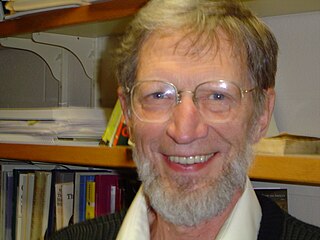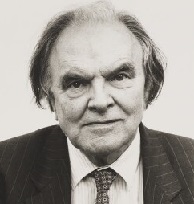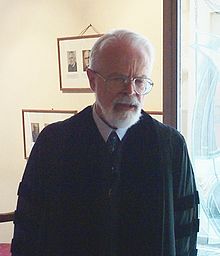
Frederick Charles Copleston was an English Roman Catholic Jesuit priest, philosopher, and historian of philosophy, best known for his influential multi-volume A History of Philosophy (1946–75).

Gottfried Wilhelm Leibniz was a German polymath active as a mathematician, philosopher, scientist and diplomat who invented calculus in addition to many other branches of mathematics and statistics. Leibniz has been called the "last universal genius" due to his knowledge and skills in different fields and because such people became less common during the Industrial Revolution and spread of specialized labor after his lifetime. He is a prominent figure in both the history of philosophy and the history of mathematics. He wrote works on philosophy, theology, ethics, politics, law, history, philology, games, music, and other studies. Leibniz also made major contributions to physics and technology, and anticipated notions that surfaced much later in probability theory, biology, medicine, geology, psychology, linguistics and computer science. In addition, he contributed to the field of library science by devising a cataloguing system whilst working at the Herzog August Library in Wolfenbüttel, Germany, that would have served as a guide for many of Europe's largest libraries. Leibniz's contributions to a wide range of subjects were scattered in various learned journals, in tens of thousands of letters and in unpublished manuscripts. He wrote in several languages, primarily in Latin, French and German.

William Payne Alston was an American philosopher. He is widely considered to be one of the most important epistemologists and philosophers of religion of the twentieth century, and is also known for his work in metaphysics and the philosophy of language. His views on foundationalism, internalism and externalism, speech acts, and the epistemic value of mystical experience, among many other topics, have been very influential. He earned his PhD from the University of Chicago and taught at the University of Michigan, Rutgers University, University of Illinois, and Syracuse University.

Alvin Carl Plantinga is an American analytic philosopher who works primarily in the fields of philosophy of religion, epistemology, and logic.

Richard Granville Swinburne is an English philosopher. He is an Emeritus Professor of Philosophy at the University of Oxford. Over the last 50 years, Swinburne has been a proponent of philosophical arguments for the existence of God. His philosophical contributions are primarily in the philosophy of religion and philosophy of science. He aroused much discussion with his early work in the philosophy of religion, a trilogy of books consisting of The Coherence of Theism, The Existence of God, and Faith and Reason.

Sir Anthony John Patrick Kenny is a British philosopher whose interests lie in the philosophy of mind, ancient and scholastic philosophy, the philosophy of religion, and the philosophy of Wittgenstein of whose literary estate he is an executor. With Peter Geach, he has made a significant contribution to analytical Thomism, a movement whose aim is to present the thought of St. Thomas Aquinas in the style of analytic philosophy. He is a former president of the British Academy and the Royal Institute of Philosophy.

Peter Thomas Geach was a British philosopher who was Professor of Logic at the University of Leeds. His areas of interest were philosophical logic, ethics, history of philosophy, philosophy of religion and the theory of identity.

The Euthyphro dilemma is found in Plato's dialogue Euthyphro, in which Socrates asks Euthyphro, "Is the pious loved by the gods because it is pious, or is it pious because it is loved by the gods?" (10a)
In analytic philosophy, actualism is the view that everything there is is actual. Another phrasing of the thesis is that the domain of unrestricted quantification ranges over all and only actual existents.
Linda Trinkaus Zagzebski is an American philosopher. She is the Emerita George Lynn Cross Research Professor, as well as Emerita Kingfisher College Chair of the Philosophy of Religion and Ethics, at the University of Oklahoma. She writes in the areas of epistemology, philosophy of religion, and virtue theory.

Nicholas Paul Wolterstorff is an American philosopher and theologian. He is currently Noah Porter Professor Emeritus of Philosophical Theology at Yale University. A prolific writer with wide-ranging philosophical and theological interests, he has written books on aesthetics, epistemology, political philosophy, philosophy of religion, metaphysics, and philosophy of education. In Faith and Rationality, Wolterstorff, Alvin Plantinga, and William Alston developed and expanded upon a view of religious epistemology that has come to be known as Reformed epistemology. He also helped to establish the journal Faith and Philosophy and the Society of Christian Philosophers.
Peter van Inwagen is an American analytic philosopher and the John Cardinal O'Hara Professor of Philosophy at the University of Notre Dame. He is also a research professor of philosophy at Duke University each spring. He previously taught at Syracuse University, earning his PhD from the University of Rochester in 1969 under the direction of Richard Taylor. Van Inwagen is one of the leading figures in contemporary metaphysics, philosophy of religion, and philosophy of action. He was the president of the Society of Christian Philosophers from 2010 to 2013.

Marilyn McCord Adams was an American philosopher and Episcopal priest. She specialized in the philosophy of religion, philosophical theology, and medieval philosophy. She was Horace Tracy Pitkin Professor of Historical Theology at Yale Divinity School from 1998 to 2003 and Regius Professor of Divinity at the University of Oxford from 2004 to 2009.
Sydney Sharpless Shoemaker was an American philosopher. He was the Susan Linn Sage Professor of Philosophy at Cornell University and is well known for his contributions to philosophy of mind and metaphysics.

Alfred Edward Taylor, usually cited as A. E. Taylor, was a British idealist philosopher most famous for his contributions to the philosophy of idealism in his writings on metaphysics, the philosophy of religion, moral philosophy, and the scholarship of Plato. He was a fellow of the British Academy (1911) and president of the Aristotelian Society from 1928 to 1929. At Oxford he was made an honorary fellow of New College in 1931. In an age of universal upheaval and strife, he was a notable defender of Idealism in the Anglophone world.
John Patrick Hawthorne is an English philosopher, currently serving as Professor of Philosophy at the Australian Catholic University in Melbourne, and Professor of Philosophy at the University of Southern California. He is recognized as a leading contemporary contributor to metaphysics and epistemology.

Barry Stroud was a Canadian philosopher and professor at the University of California, Berkeley. Known especially for his work on philosophical skepticism, he wrote about David Hume, Ludwig Wittgenstein, the metaphysics of color, and many other topics.
Brian Leftow is an American philosopher specializing in philosophy of religion, medieval philosophy, and metaphysics. He is the William P. Alston Professor for the Philosophy of Religion at Rutgers University. Previously, he held the Nolloth Chair of the Philosophy of the Christian Religion at Oriel College, Oxford, succeeding Richard Swinburne.
Eleonore Stump is an American philosopher and the Robert J. Henle Professor of Philosophy at Saint Louis University, where she has taught since 1992.
Dutch philosophy is a broad branch of philosophy that discusses the contributions of Dutch philosophers to the discourse of Western philosophy and Renaissance philosophy. The philosophy, as its own entity, arose in the 16th and 17th centuries through the philosophical studies of Desiderius Erasmus and Baruch Spinoza. The adoption of the humanistic perspective by Erasmus, despite his Christian background, and rational but theocentric perspective expounded by Spinoza, supported each of these philosopher's works. In general, the philosophy revolved around acknowledging the reality of human self-determination and rational thought rather than focusing on traditional ideals of fatalism and virtue raised in Christianity. The roots of philosophical frameworks like the mind-body dualism and monism debate can also be traced to Dutch philosophy, which is attributed to 17th century philosopher René Descartes. Descartes was both a mathematician and philosopher during the Dutch Golden Age, despite being from the Kingdom of France. Modern Dutch philosophers like D.H. Th. Vollenhoven provided critical analyses on the dichotomy between dualism and monism.












